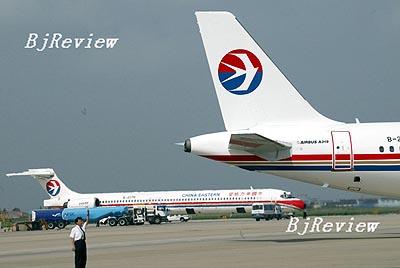
While the long discussed high-speed railway between Beijing and Shanghai has not yet been built for various reasons, the air route between the two cities is currently running an airborne bus route.
Initiated by the Civil Aviation Administration of China (CAAC), five Chinese airlines--Air China, China Eastern Airlines, Shanghai Airlines, China Southern Airlines and Hainan Airlines-have jointly launched an express air service between Beijing and Shanghai. With an average of one flight every 30 minutes between the two metropolises, passengers can utilize the timely convenience as well as transfer to flights from any of the other four airlines.
This express air service greatly facilitates passengers flying between Beijing and Shanghai. If they want to, fans taking in an Olympic soccer match in Shanghai early in the day can hop on a plane and catch the later one in Beijing.
Down to three hours
The air route between Beijing and Shanghai has the largest passenger volume in China. Figures from the CAAC show that in 2006 a total of 4.18 million passengers took flights between the two cities-an average of 11,000 passengers a day-and there were 36 flights between the Beijing Capital International Airport and the Shanghai Hongqiao International Airport every day.
Some business travelers need to make several trips between Beijing and Shanghai within a short time span, and the air service allows them to travel as quickly as possible. But since they could not previously transfer to flights of other airlines and the interval of flights of the same airline might be one hour or longer, travelers sometimes needed five or six hours from the time they checked in to the time they stepped out of the terminal airport.
The launch of the express air service shortens the traveling time between Beijing and Shanghai. Information released by the CAAC shows that normally travelers only need about three hours to complete the journey between the two airports, about two hours less than before. According to the CAAC, for normal express air service flights between Beijing and Shanghai, the average travel time is two hours and 50 minutes, including check out and check in.
The need for speed
In order to complete a journey in around three hours-not counting flying time-check-in, baggage check, security check, boarding and baggage claim must be done within 45 minutes.
According to Wang Yongsheng, a spokesman for Air China, express air service shortens the travel time mainly by speeding up the ground procedures.
In order to provide faster service, all airlines cooperating in the express air service passed a multi-lateral cooperation agreement, confirming they would adopt uniform clearance standards and transferring procedures.
In the past, because of the tedious check-in procedures, travelers needed to arrive at the terminal far ahead of the departure time. The time before boarding was often longer than the time in the air. For the express air service, special check-in counters, self-service check-in machines, security check channels, baggage claim machines and waiting rooms are set up in the Beijing Capital International Airport and the Shanghai Hongqiao Airport in order to reduce the waiting time of travelers.
Another characteristic of the express air service is the dense flight interval. One flight every 30 minutes on average helps change flying habits. Arriving at an airport and buying a ticket is almost as easy as taking a bus. According to Wang, the flights may be adjusted to depart on the hour and half hour in the future, with a possible flight every 15 minutes during peak periods.
With the express air service between Beijing and Shanghai, check-in ends 20 minutes before the departure time, possibly changing to 15 minutes in the future. For other flights, check-in ends 30 minutes before the departure time. Moreover, the security check time is also reduced to 1.5 minutes per person on average, half of that for other flights.
Coping with faster trains
Li Xiaojin, professor at the Civil Aviation University of China, says that the express air service between Beijing and Shanghai is meant to cope with the possible impact brought by high-speed trains. Li was a participant in drawing up rules for the express air service.
After the Chinese railway authority raised the train speed for the sixth time on April 18, 2007, the fastest trains only need a little under 10 hours to go between Beijing and Shanghai. With the speed and the fact that they are not influenced by bad weather, some air travelers have been diverted to the trains. "In routes of about 1,000 km, there is obvious competition between train and plane," Li said.
At present, a soft sleeper ticket for non-stop trains between Beijing and Shanghai costs 499 yuan, and a soft seat ticket for China Railway High-Speed (CRH), the most advanced and fastest train in China, costs 538 yuan. An air ticket of 50-percent discount costs 565 yuan, and coupled with the airport construction fee and fuel surcharge, climbs to 695 yuan.
"Compared with trains, the price gap is not marked, but planes gain obvious advantage in speed," Li said. "With the Beijing-Shanghai route, business travelers are the majority since they don't want to waste time."
| 